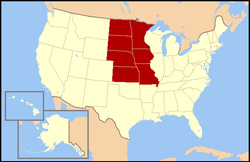Top Qs
Timeline
Chat
Perspective
West North Central states
Group of states in the Central North-western part of the US From Wikipedia, the free encyclopedia
Remove ads
The West North Central states form one of the nine geographic subdivisions within the United States that are officially recognized by the U.S. Census Bureau.
This article relies largely or entirely on a single source. (April 2020) |
Seven states compose the division: Iowa, Kansas, Minnesota, Missouri, Nebraska, North Dakota and South Dakota and it makes up the western half of the Midwestern United States; the eastern half of which consists of the East North Central states of Illinois, Indiana, Michigan, Ohio and Wisconsin.[1] The Mississippi River marks the bulk of the boundary between these two divisions.
The West North Central states are regarded as constituting the core of the nation's "Farm Belt." Another name popularly applied to the division is the "Agricultural Heartland," or simply the "Heartland."
Since the early 1990s, the West North Central division has consistently had the lowest unemployment rate in the United States (especially in its many college towns), and has also been noted for its plentiful supply of affordable housing.
Remove ads
Demographics
Summarize
Perspective
As of 2020, the West North Central states had a combined population of 21,616,921. This number is a 5.4% increase from 20,505,437 in 2010. The West North Central region covers 507,913 square miles (1,315,489 km2) of land, and has an average population density of 42.56 people per square mile.

| 1 | Twin Cities (MN-WI) | 3,685,561 |
| 2 | St. Louis, MO-IL | 2,806,100 |
| 3 | Kansas City, Missouri-KS | 2,172,902 |
| 4 | Omaha, Nebraska-IA | 963,221 |
| 5 | Des Moines, Iowa | 721,326 |
| 6 | Wichita, Kansas | 649,230 |
| 7 | Springfield, Missouri | 473,702 |
| 8 | Quad Cities IA-IL (Davenport) | 376,502 |
| 9 | Lincoln, Nebraska | 340,954 |
| 10 | Duluth, MN-WI | 287,430 |
Remove ads
Politics
Summarize
Perspective
Kansas, Nebraska, South Dakota, and North Dakota have consistently voted for Republican presidential candidates since 1968. Minnesota has consistently voted for Democratic presidential candidates since 1976. Missouri has consistently voted for Republican presidential candidates since 2000. Iowa voted for Trump in 2016 and 2020, but previously voted for Democratic presidential candidates from 2012 to 1988, except in 2004 when it voted for George W. Bush.
| Parties | |||||
| Democratic-Republican | Democratic | Republican | Liberal Republican | Populist | Progressive |
- Bold denotes election winner.
Remove ads
See also
Notes
- † McCain and Trump won the overall state, but Barack Obama won Nebraska's 2nd congressional district in the 2008 election, while Joe Biden won it in the 2020 election and Kamala Harris won it in the 2024 election.
References
Wikiwand - on
Seamless Wikipedia browsing. On steroids.
Remove ads






